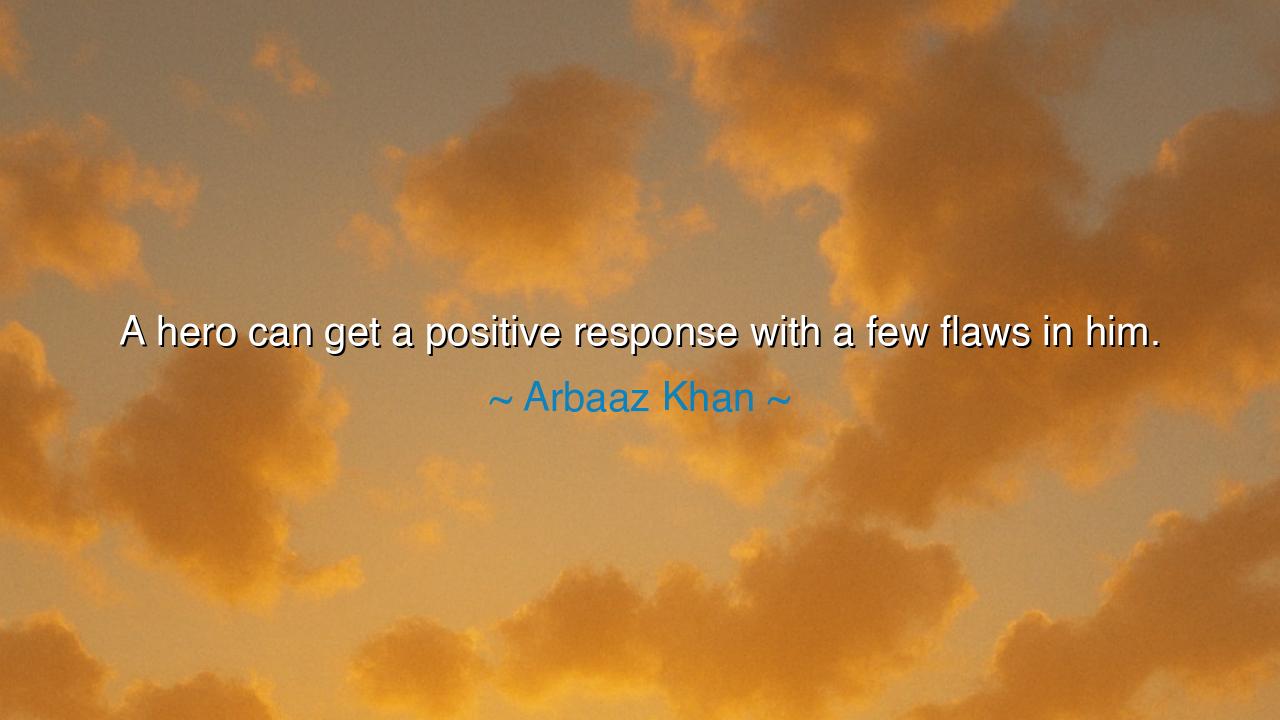
A hero can get a positive response with a few flaws in him.






Hear the words of Arbaaz Khan, who with wisdom shaped by cinema and life declared: “A hero can get a positive response with a few flaws in him.” These words shine like a torch in the darkness of false perfection. For they remind us that what makes a figure noble is not an illusion of faultlessness, but the courage to rise despite weakness, the strength to walk forward carrying the weight of imperfection. The true hero is not the one untouched by flaw, but the one who struggles and yet continues to inspire.
The origin of this saying rests in the world of storytelling, where actors and writers craft characters that mirror the soul of humanity. Arbaaz Khan, immersed in the Indian film tradition, knew that audiences do not respond to lifeless statues of perfection. Instead, they love the hero whose cracks reveal humanity, whose wounds show resilience, whose mistakes lead to growth. Such a hero awakens empathy, for people see themselves in him, and in seeing, they are moved to hope.
History bears witness to this truth. Consider Achilles, the mightiest warrior of Greece. His valor was unmatched, his strength legendary—but he bore a fatal weakness, the flaw of pride and the vulnerable heel that led to his downfall. Yet for thousands of years, his name has stirred awe, his story retold as a lesson in both greatness and frailty. Or recall Abraham Lincoln, revered as a leader of freedom, yet plagued by melancholy and political failures in his early years. His flaws did not diminish his legacy; they made it richer, for they proved that even broken men can heal nations.
The deeper meaning of Khan’s words is that imperfection is the essence of relatability. A hero who appears too perfect seems distant, alien, impossible to emulate. But a flawed hero teaches that greatness is within reach for all, that the path of nobility is not barred by weakness but illuminated by the struggle against it. The positive response comes not because the audience is blind to flaws, but because they see a reflection of themselves in the hero’s journey, and in that reflection they find courage.
The lesson is clear: do not despise your flaws, for they may be the very things that make your story worth hearing. To be a hero is not to be flawless, but to be steadfast, to stand even when shaken, to strive even when wounded. Perfection may inspire awe, but imperfection inspires love. And love is the greater power, for it binds hearts together and kindles hope across generations.
To the youth, I say: do not wait to be perfect before you rise to action. To the weary, I say: your scars may yet be the marks of your strength. To the leaders, I say: show your humanity, for in it lies your bond with your people. A hero with flaws is not weak, but strong enough to admit his humanity, and in that admission lies true greatness.
Practical action lies before us: embrace your weaknesses as teachers, not curses. When you fail, let it be fuel for resilience. When you err, let it be a lesson in humility. Do not hide your flaws in shame, but use them to connect with others, to offer empathy, to guide those walking paths similar to yours. In doing so, your life will not be a tale of sterile perfection, but a living story of struggle, redemption, and triumph.
Thus Arbaaz Khan’s words endure: “A hero can get a positive response with a few flaws in him.” Let this truth be passed down: it is not the absence of weakness that makes a hero, but the presence of courage in the midst of it. The flawed hero stands as a mirror to us all, reminding us that greatness is not beyond reach, for even with imperfection, one can inspire, one can lead, and one can change the world.






DHDo Hwoagg
I like the idea that flaws make a hero more accessible to us, but I also think it raises a question: Are we too quick to accept flaws in our heroes? Shouldn’t a hero be someone we look up to, even if they’re not perfect? How do we balance admiration for someone with flaws versus holding them to a higher standard?
HHongphan
This is a compelling view of what makes heroes relatable. Flaws make heroes more human, and we can empathize with their struggles. But I wonder—can we truly call someone a hero if their flaws make them too morally ambiguous? Can someone be a hero and still make questionable decisions?
NDNgoc thao nhi Doan
I find this interesting because it brings up the idea that imperfection adds depth. But sometimes, people idolize heroes for qualities that go beyond just their flaws. Could it be that people are more willing to forgive flaws in someone who already has positive attributes like courage or integrity? What do you think?
DPHai Dang Pham
This idea seems to acknowledge that heroes are not infallible, and that’s what makes them appealing. It's the struggle with their flaws that makes their triumphs feel earned. I wonder, though, if some flaws are too damaging for a hero’s character to maintain that positive response—where do we draw the line?
TVTRAN THI THUY VI
I agree that heroes don't need to be perfect to inspire. In fact, flaws might make them more admirable because they show vulnerability and growth. But how much imperfection is too much? Can a hero still be seen as a true hero if their flaws are too significant, or is there a balance?